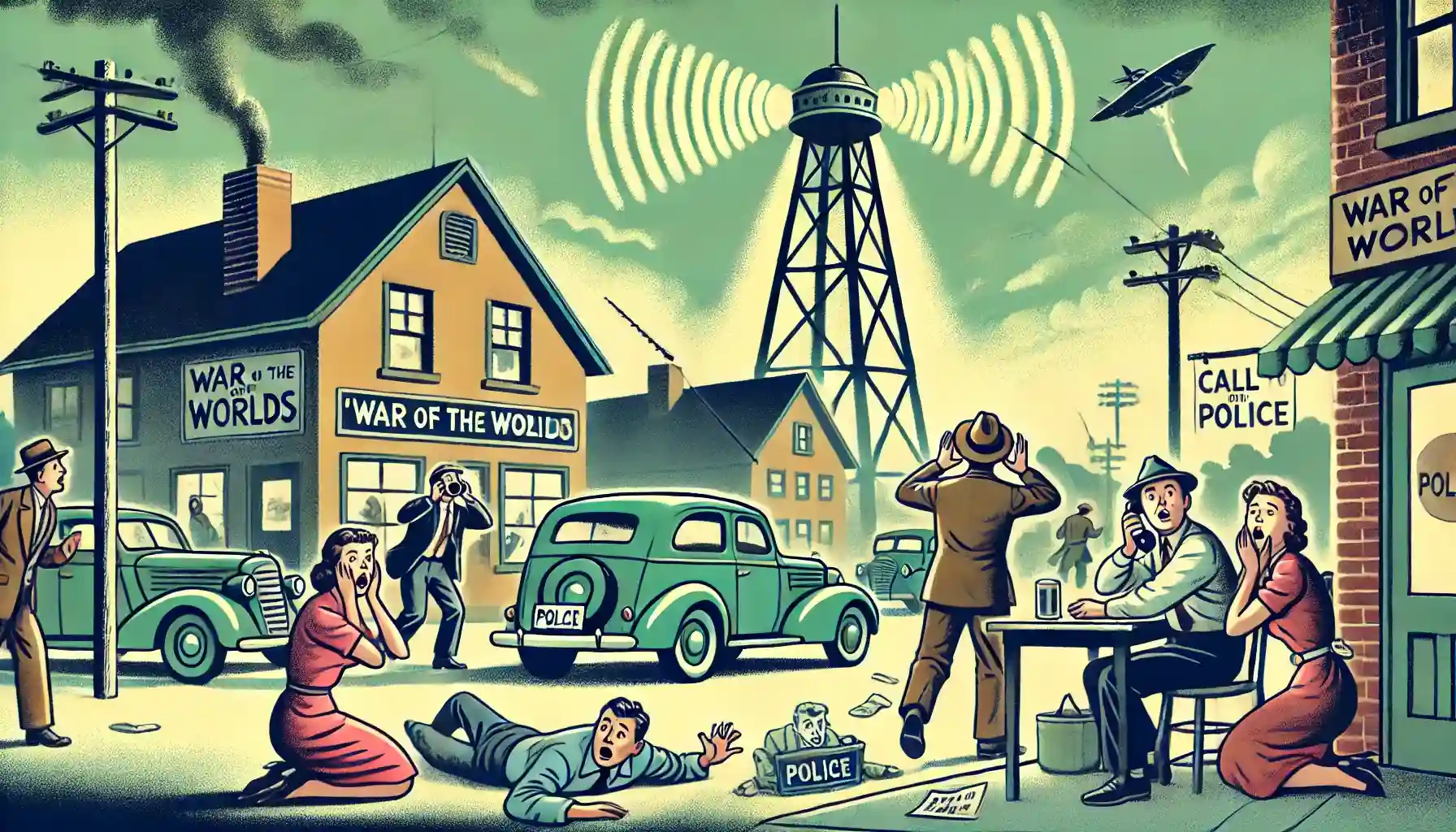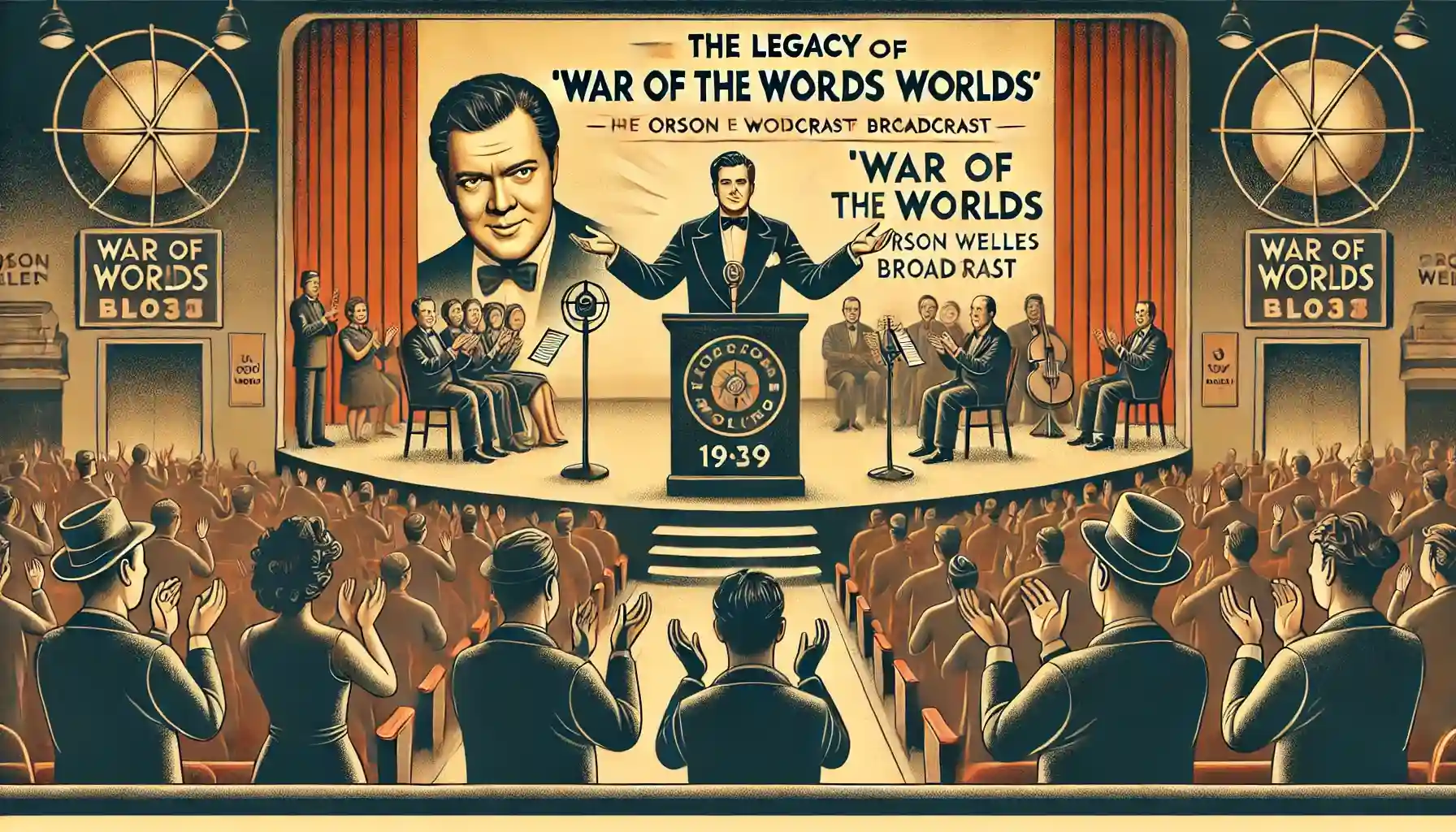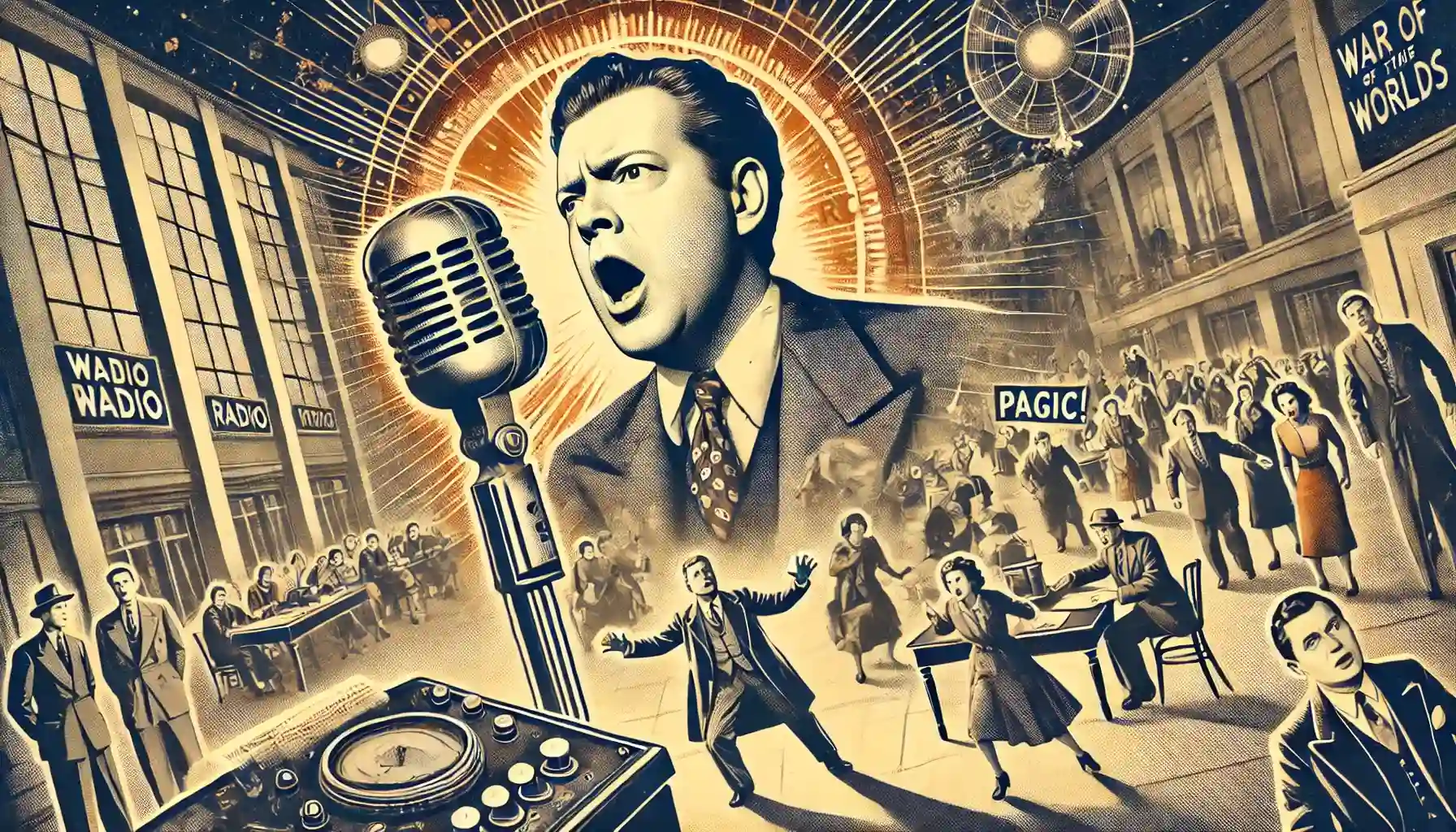The infamous broadcast of “The World War” wreaks havoc
この英語教材のテーマは「実際の出来事でカジュアルな英語を学ぶ」
The theme of this English resource is “Learn casual English through real events.”
Section 1: The Infamous Broadcast of “War of the Worlds”
On October 30, 1938, Orson Welles aired the famous radio drama “War of the Worlds.” It was broadcasted in the style of breaking news, making it sound incredibly realistic. Many listeners who tuned in after the show had already begun mistook the fictional Martian invasion for an actual news event. Panic spread, with people thinking they were witnessing a real extraterrestrial attack. The radio drama caused a stir and left its mark on media history, showing just how powerful the medium could be when the audience wasn’t fully prepared.
Q1: What are your thoughts on this part of the article?
Sample Answer: “It’s fascinating that a radio drama could create such mass panic! It really shows how much people trusted the radio as a source of information back then.”
Q2: Create a question excerpted from this article.
Sample Answer: “Why did so many people mistake the radio drama for real news?”
Q3: How would you sum up this section in a few words?
Sample Answer: “Realistic broadcast causes panic.”
Now, let’s talk using idioms.
・Let the students choose one favorite idiom and make an example sentence.
Idiom used: “Left its mark”
Explanation: This idiom means to have a lasting impact or influence on something.
Example Sentence: “The radio drama left its mark on media history, showing how influential broadcasting could be.”
セクション 1: 有名な「宇宙戦争」ラジオ放送
1938年10月30日、オーソン・ウェルズは有名なラジオドラマ「宇宙戦争」を放送しました。このドラマは臨時ニュースのスタイルで放送され、とてもリアルに聞こえるものでした。番組の途中から聴き始めた多くのリスナーは、架空の火星人の侵略を実際のニュースだと勘違いしてしまいました。その結果、火星人による本物の攻撃が起きていると考えた人々の間でパニックが広がりました。このラジオドラマはメディア史に大きな影響を与え、聴衆が完全に準備できていない場合、メディアがどれほど強力であるかを示しました。
Q1: この部分についてどう思いますか?
サンプル回答: 「ラジオドラマがこんなにも大規模なパニックを引き起こすなんて興味深いですね!当時の人々がラジオを情報源としてどれだけ信頼していたかがよく分かります。」
Q2: この記事から引用された質問を作成してください。
サンプル回答: 「なぜ多くの人がラジオドラマを本物のニュースと勘違いしたのでしょうか?」
Q3: このセクションを数語で要約すると?
サンプル回答: 「リアルな放送がパニックを引き起こす」
使用されたイディオム: “Left its mark”
説明: このイディオムは、何かに持続的な影響やインパクトを与えることを意味します。
例文: 「そのラジオドラマはメディア史に影響を残し、放送がどれほど影響力を持つかを示しました。」
Section 2: The Power of Media and Public Reaction

The panic caused by “War of the Worlds” highlighted just how much influence media could have over the public. During the broadcast, people fled their homes, called the police, and some even gathered supplies, convinced that Martians had landed. The event became a powerful example of how easily misinformation could spread if delivered in a convincing manner. It served as a warning that people needed to think critically about the information they receive, especially from mass media.
Q1: What are your thoughts on this part of the article?
Sample Answer: “It’s surprising how quickly people can panic when they hear something unexpected, especially from a trusted source. It makes you realize the power of media.”
Q2: Create a question excerpted from this article.
Sample Answer: “How did people react to the broadcast, and what does it tell us about the power of media?”
Q3: How would you sum up this section in a few words?
Sample Answer: “Media influence and public panic.”
Now, let’s talk using idioms.
・Let the students choose one favorite idiom and make an example sentence.
Idiom used: “Think critically”
Explanation: This idiom means to analyze and evaluate information in a careful and rational way rather than accepting it at face value.
Example Sentence: “The broadcast taught people to think critically about the information they receive.”
セクション 2: メディアの力と大衆の反応
「宇宙戦争」が引き起こしたパニックは、メディアが大衆に対してどれほどの影響を持つかを浮き彫りにしました。放送中、多くの人々が家から逃げ出し、警察に通報し、中には火星人が上陸したと信じて物資を集めた人もいました。この出来事は、説得力のある形で情報が提供されると、誤情報がいかに簡単に広がるかを示す強力な例となりました。これは、特にマスメディアから受け取る情報について、人々が批判的に考える必要があるという警告として機能しました。
Q1: この部分についてどう思いますか?
サンプル回答: 「信頼できる情報源から何か予期せぬことを聞いた時、人々がどれほど速くパニックに陥るか驚きです。メディアの力を実感させられます。」
Q2: この記事から引用された質問を作成してください。
サンプル回答: 「人々は放送にどのように反応し、それはメディアの力について何を教えてくれますか?」
Q3: このセクションを数語で要約すると?
サンプル回答: 「メディアの影響と大衆のパニック」
使用されたイディオム: “Think critically”
説明: このイディオムは、情報をそのまま受け入れるのではなく、注意深く理性的に分析・評価することを意味します。
例文: 「その放送は、人々に受け取る情報について批判的に考えることを教えました。」
Section 3: Legacy and Cultural Impact

The impact of the “War of the Worlds” broadcast is still felt today. It remains a classic example of the power of storytelling and the influence media has over its audience. It also influenced the regulation of broadcasting standards to prevent similar misunderstandings. Orson Welles, who directed the broadcast, became an overnight sensation, and his career skyrocketed. The incident even inspired other works of art and led to numerous studies on media influence and public behavior.
Q1: What are your thoughts on this part of the article?
Sample Answer: “It’s incredible how this single broadcast shaped both Orson Welles’ career and future broadcasting standards. It shows the importance of responsible storytelling.”
Q2: Create a question excerpted from this article.
Sample Answer: “What impact did the ‘War of the Worlds’ broadcast have on future broadcasting standards?”
Q3: How would you sum up this section in a few words?
Sample Answer: “Broadcast’s legacy and impact.”
Now, let’s talk using idioms.
・Let the students choose one favorite idiom and make an example sentence.
Idiom used: “Overnight sensation”
Explanation: This idiom means to become famous or well-known very quickly, often unexpectedly.
Example Sentence: “Orson Welles became an overnight sensation after the ‘War of the Worlds’ broadcast.”
セクション 3: 遺産と文化的影響
「宇宙戦争」放送の影響は今日でも感じられています。それは物語の力とメディアが視聴者に及ぼす影響の古典的な例として残っています。また、同様の誤解を防ぐために放送基準の規制にも影響を与えました。この放送を監督したオーソン・ウェルズは、一夜にして有名人となり、彼のキャリアは急上昇しました。この出来事は他の芸術作品にも影響を与え、メディアの影響や大衆の行動に関する数多くの研究を生み出しました。
Q1: この部分についてどう思いますか?
サンプル回答: 「このたった一回の放送がオーソン・ウェルズのキャリアと将来の放送基準に影響を与えたのは驚くべきことです。責任あるストーリーテリングの重要性を示しています。」
Q2: この記事から引用された質問を作成してください。
サンプル回答: 「『宇宙戦争』の放送は将来の放送基準にどのような影響を与えましたか?」
Q3: このセクションを数語で要約すると?
サンプル回答: 「放送の遺産と影響」
使用されたイディオム: “Overnight sensation”
説明: このイディオムは、非常に短期間で有名になることを意味します。多くの場合、それは予期せぬ形で起こります。
例文: 「オーソン・ウェルズは『宇宙戦争』の放送後、一夜にして有名人となりました。」






